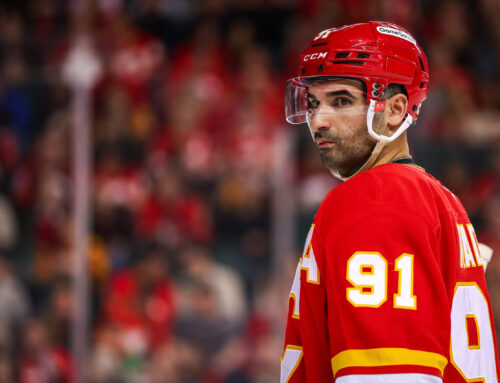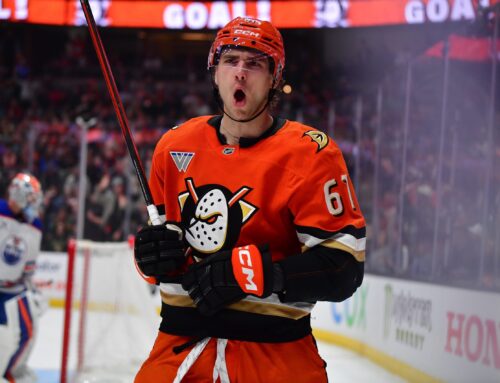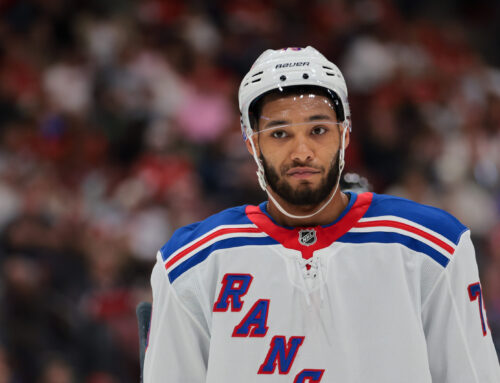
This year’s UFA class could be a bit of a strange one.
As I mentioned in the comments of my top 10 column last week, there is such a bevy of great RFAs, that many of the UFAs will be overlooked. I believe teams will be looking to take care of their RFAs first, and then worry about signing UFAs so they have a better grasp on the salary cap. That could mean a lot of UFAs — outside of most of the big names — may be waiting a little while longer than normal before signing.
Of course, every year comes with free agents that teams regret signing. In the past few years, we’ve seen players such as James Neal, Milan Lucic, Karl Alzner, Loui Eriksson and Andrew Ladd sign big deals that teams regret within half a season. However, there are many fantasy general managers who believed in these signings and tried to acquire these players, either through trades or through drafts.
This year will be no different. There will be players that will sign and you’ll convince yourself, “yeah, all he needed was a second chance.” That is usually a losing proposition. Most players don’t automatically become a great force in fantasy leagues simply because they signed with a new team.
Below are 10 UFAs you need to be wary of this offseason.
10. Robin Lehner
Lehner was a great story of this past season, battling back from mental health issues and drug and alcohol addiction to become a Vezina finalist. He had career bests in wins, shutouts, goals against average and save percentage. However, much of his success came from the defensive system employed by Barry Trotz (note that Thomas Greiss put up very similar numbers in a time-share situation, but no one mentions Greiss for the Vezina). If Lehner comes back with the Islanders, then there’s a good chance he can continue his success. If he goes to a squad that is more run and gun, expect more of his career averages.
9. Ryan Dzingel
When Columbus originally acquired Dzingel before the trade deadline, Jackets GM Jarmo Kekalainen said that Dzingel wasn’t acquired to be a rental and the hope was to re-sign him. That may have changed after a disappointing performance in Columbus, where he had four goals and 12 points in 21 games, and wound up in coach John Tortorella’s doghouse. Eventually, Dzingel became a healthy scratch in the postseason. He’s scored 49 goals over the last two years, so many will hope that he can continue that with a new team. However, most of those goals came because he was playing with elite linemates. More than likely, that won’t happen again next season.
I like Karlsson as much as the next guy, but we’re getting to the stage of his career where we have to start treating him like Kris Letang: An elite multi-cat defenseman who can’t stay healthy. TSN hockey analyst Gord Miller said Karlsson could barely walk during the playoffs, and Karlsson was eventually pulled from the lineup due to injury. Karlsson has missed five, 11 and 29 games the last three seasons, and even when in the lineup, was not playing 100 per cent. If he can stay healthy, there’s a good chance he can reach 70 points again, but that will happen no matter where he signs. Don’t buy into the hype that he could obliterate career highs if he goes to a powerhouse team.
7. Petr Mrazek/Curtis McElhinney
I’m combining these two because they are pretty much in the same situation as both netminders were outstanding for Carolina this season. However, much like Lehner, much of their value will depend on if they re-sign in Carolina. If they wind up elsewhere, they could struggle with a new system that doesn’t focus on defense or controlling the shot attempts.
This player should have every fantasy GM wary when he signs, but there is bound to be one or two GMs who will think to themselves: “Boy, Gardiner is sure to bounce back manning the power-play of his new team,” followed by a massive disappointment once the season begins. Gardiner has had a couple of good seasons, but I wouldn’t trust him to get back to those totals.
Pirri has dominated the AHL the last couple of seasons (including 42 points in 29 games this year), and showed excellent promise in the NHL, with 12 goals and 18 points in 31 games. There are just a few problems: One is that he is 28 years old, and it’s really late in his career to be showing promise. The second is of those 18 points, 13 of them came in his first 11 games. After that, he had just five points in 20 games. He’s now had five different squads to try to get a full-time job with and hasn’t been able to. I wouldn’t expect that to change with team number six.
Someone is going to overpay for Nyquist, both in the NHL and in your fantasy leagues. After a great start to his fantasy career in 2013-14 with 28 goals and 48 points in 57 games, fantasy general managers fell in love with Nyquist. He quickly disappointed, seeing a decline in goals and points almost every season. This year, he miraculously had a bounce-back year with 22 goals and 60 points, but don’t expect a repeat next year. He’ll be one of those players that we look back at next season and think to ourselves “Of course he had career highs, he was playing for a big contract.”
I’ve mentioned this before, but Eberle has to be the most disappointing fantasy player of this generation. Sure, there’s been bigger busts (Nail Yakupov, for example), but Eberle wins on longevity as he seems to disappoint year after year. He had just 37 points this year, the worst of his career, but he’s ever only reached 70 points once in his career, way back in 2011-12. He’s going to get some love and hope that he can get back to his old ways if he signs with a new team, but don’t be fooled.
Simmonds is one of those typical powerhouse forwards that sees a major drop in production once he hits his late 20s. His goal, points, shots, hits, power-play goals, power-play points and blocked shots have all seen that dramatic dropoff over the last couple of years. It was somehow even worse once he got to Nashville, where he averaged under 12:30 a game and had just three points in 17 games. There’s going to be a lot of general managers who believe he will rebound if he goes to a team where he could get top-six ice time, but odds are he’ll be similar to Milan Lucic in Edmonton: A massive disappointment.
1. Matt Duchene
Despite his recent 70-point season, I still maintain you should treat Duchene as a 55-point player. The last time he had a 70-point season was in 2013-14, which, coincidentally, is the last time he had to negotiate a contract. Since then, his point production ranged from 41 to 59 points until this season, when he was playing for his next contract. It’s also important to point out that Duchene had most of his points this year with Ottawa. Once he went to Columbus, he had 12 points in 23 games. Unless he signs a one-year deal, you’d be foolish to expect that he will reach 60 points again next year.





 MTL
MTL
 PIT
PIT FLA
FLA S.J
S.J CGY
CGY MIN
MIN PHI
PHI NSH
NSH
